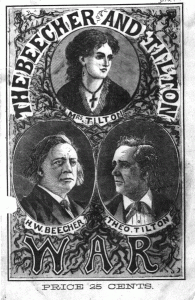Henry Ward Beecher, one of the most famous and influential — but also controversial — preachers and orators of 19th-century America, was born in Litchfield, Connecticut, today in 1813. Henry was one of several literary giants of the extended Beecher family: his father Lyman was also a notable preacher; his sister Harriet found international fame as the author of Uncle Tom’s Cabin; and sisters Isabella Beecher Hooker and Catherine Beecher influenced many with their well-articulated views on women’s rights and education.
As a student at a preparatory school in Amherst, Massachusetts, Henry discovered he had a gift for public speaking. After graduating from Amherst College in 1834, he entered the ministry and followed his father’s family to the Midwest, preaching in Ohio and Indiana. His growing ministerial reputation earned him an offer, which he accepted, to preside over the new Plymouth Congregational Church in Brooklyn, New York. There, his popular preaching style turned him into a regional celebrity.
Like many of his siblings, Henry was an outspoken abolitionist. As antebellum tensions over slavery increased, he began infusing his sermons with powerful anti-slavery messages. He wrote scathing criticisms of the Compromise of 1850 and other political acts he viewed as concessions to the slave-holding South. These were widely circulated, earning him both national celebrity and death threats from pro-slavery advocates. Undeterred, Beecher raised money to purchase rifles for anti-slavery settlers during the “Bleeding Kansas” crisis of the 1850s, arms that were quickly nicknamed “Beecher’s Bibles” by the press.
Once the Civil War began, the question of whether the British government – whose textile-based economy was highly dependent on cotton – would side with the Confederacy loomed large. President Abraham Lincoln sent Beecher on a speaking tour of Europe in 1863 to bolster public support for the Union cause. The reception his speeches received added to the preacher’s status and elevated him to international celebrity.
 One of the many tabloid-esque publications spurred by the Beecher-Tilton scandal.
One of the many tabloid-esque publications spurred by the Beecher-Tilton scandal.Beecher’s fame had a dark side. He was dogged by rumors of womanizing throughout his career, but the undercurrent of rumors became a widely published national scandal during the Beecher-Tilton scandal of the 1870s. Beecher stood trial for charges of adultery filed by Elizabeth Tilton’s husband, which historian Walter McDougall deemed “the most sensational ‘he said, she said’ [story] in American history.” The sordid details of the lengthy trial — which involved prominent New Yorkers as well as the famous suffragists Victoria Woodhull and Elizabeth Cady Stanton — were splashed across the front pages of newspapers across America. Beecher was ultimately acquitted.
Though he lived thereafter with a stain on his reputation, Beecher remained a relatively popular speaker throughout his life. When He died from a stroke in 1887 at age 73, over 40,000 people came to pay their respects in Brooklyn, remembering a man who, despite a checkered reputation, was still one of the most influential people in the United States.
Further Reading
Gregg Mangan, “Henry Beecher: A Preacher with Political Clout,” connecticuthistory.org
“Henry W. Beecher,” Ohio History Central

